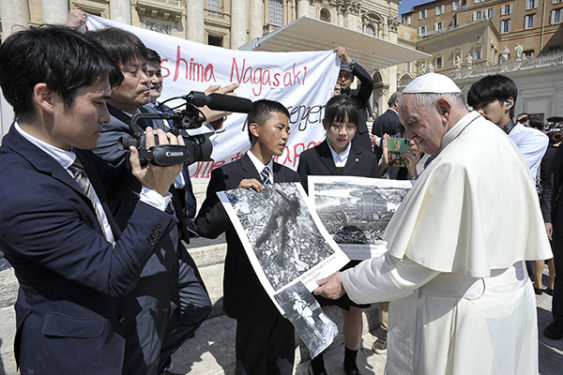
By Elise Harris
ROME (Crux) – Asia seems to be squarely in Pope Francis’s sights, with one major outing taking shape for later this year and another reportedly under consideration for 2021.
Though dates have not yet been officially released, it’s widely believed that the pontiff will travel to Thailand and Japan in November, nations in which Catholics represent a tiny fraction of the overall population – just about 0.5 percent in each. Both are majority Buddhist countries, though Japan also has a strong Shinto tradition and Thailand has significant Muslim and Hindu minorities.
Pope Francis also has been invited to revisit the Philippines in 2021, the third-largest Catholic nation in the world after Brazil and Mexico, and by far the largest Catholic nation considered part of Asia. He made his first visit to the Philippines in 2015, featuring a plane trip in the teeth of a tropical storm and a final Mass that drew the largest crowd in papal history with six million people.
On background, sources in Rome have confirmed to Crux that the trip to Japan is certain, but a formal announcement is on hold while the dates and some logistics are being finalized. At the moment, the projected dates are Nov. 23-26, with stops in Tokyo, Hiroshima and Nagasaki.
Rumors have been circulating for months that the Holy Father will also stop in Thailand, possibly from Nov. 20-23. The story has been widely reported in Thai papers, however, so far, no formal confirmation of the trip has been made.
In comments to Crux the new Vatican spokesman Matteo Bruni said “the only journey currently indicated as being studied” for this year “is the one to Japan.” As for the 2021 visit to the Philippines, he said so far “the agenda hasn’t been set” for next year, let alone 2021.
Before his appointment, Bruni served as the Vatican’s coordinator for journalists on papal trips.
Pope Francis has always had a particular interest in Asia, where Christianity is rapidly expanding, but the Japan visit would fulfill a lifelong dream for the pontiff, who as a young Jesuit wanted to travel to the country as a missionary but was unable to because of his health.
In a message for the Aug. 6-15 “Ten Days of Prayer for Peace” event, an annual commemoration of the dropping of the atomic bombs on Hiroshima and Nagasaki, which collectively claimed some 210,000 lives, Archbishop Mitsuaki Takami of Nagasaki, president of the Japanese bishops’ conference, said he looks forward to “sending a new peace message to the world” with Pope Francis’s visit.
Noting that nuclear disarmament has been a pillar of the pontiff’s international advocacy since the beginning, Takami said “nuclear threats cannot respond effectively” to issues such as terrorism, global military conflicts, poverty and environmental degradation.
“Stability based on fear simply increases fear and compromises trusting relationships among nations. In that case, we must ask ourselves how stability can be maintained,” he said, insisting that peace is built on justice, mutual trust and respect for fundamental human rights.
Pope Francis is expected to issue a similar appeal for peace during his visit, which would mark the first papal trip to Japan since St. John Paul II visited some 39 years ago, in February 1981.
Should he visit Thailand, his visit would also coincide with this year’s celebration of the 350th anniversary of the Vatican’s Mission to Siam, as the country was previously known.
Catholics amount to just 0.46 percent of the population in the country, most of whom hail from China or Vietnam.
In 2013, former Thai Prime Minister Yingluck Shinawatra invited the Holy Father to visit the country during a visit to the Vatican. However, her term ended in 2014, and she later fled Thailand after being convicted of failing to prevent corruption in a rice subsidy program which cost taxpayers billions of dollars.
It is unclear whether the country’s new prime minister, Prayut Chan-o-cha, has extended a similar invitation to the pontiff, who would have to walk delicately as the country continues to reel from the political unrest sparked by the 2014 military coup d’état.
Yet on a political level, Pope Francis would likely face the most complexities not in Thailand, but during his possible visit to the Philippines.
Rome sources have confirmed to Crux reports that Catholic bishops in the Philippines issued a formal invitation to Pope Francis to visit in 2021, asking him to come in honor of the 500th anniversary of the arrival of Christianity in the country.
According to the Philippine news site Philstar Global, festivities are slated to take place in Cebu, where Portuguese explorer Ferdinand Magellan brought the highly revered image of the Santo Niño in 1521, introducing Christianity to the island chain.
However, there are questions as to whether Pope Francis will receive an official invite from Philippine President Rodrigo Duterte, who has been vocally hostile to the Catholic Church.
Duterte has been at odds with the country’s Catholic Church since before he took office in 2016. Church leaders have condemned his bloody crackdown on the drug trade which has left thousands of people dead in extrajudicial killings, as well as his efforts to reintroduce the death penalty.
Catholics in the country have often been the targets of inflammatory comments made by Duterte, who claims to have been sexually abused by a priest in the late 1950s. In March, he said the country’s bishops are “fools” who are “good for nothing.”
Despite these tensions, officials at the bishops’ conference still hope there is “some possibility” Francis will accept the invitation.
